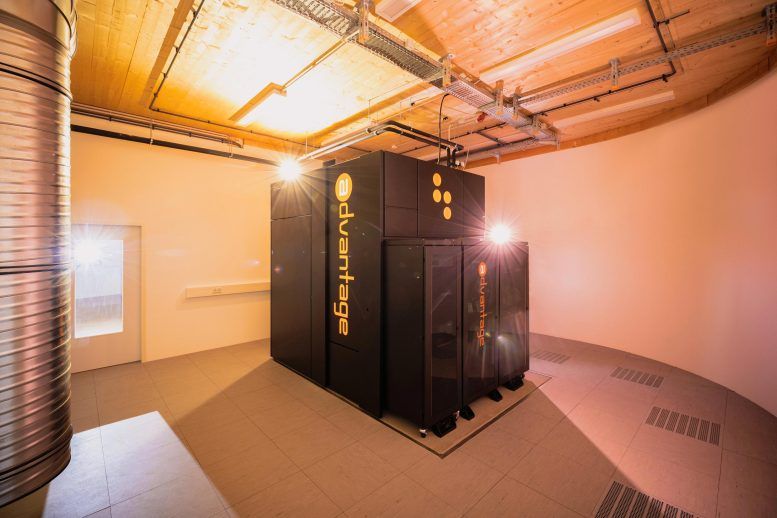The official launch marks an important milestone in the European development of quantum computing.
Forschungszentrum Julich has operated a quantum annealer that can process more than 5,000 qubits. Today, the Julich Supercomputing Centre and D-Wave Systems (a leader in quantum computing systems) launched the first cloud-based quantum service for customers outside North America. This new system, located in Julich, will work closely with the JSC supercomputers in the future. The Julich Unified Infrastructure for Quantum Computing (JUNIQ) was created in the autumn of 2019 to allow researchers in Europe and Germany access to different quantum systems. It includes annealing quantum computers. The plan was officially inaugurated today by the Federal Minister of Education and Research, Bettina stark-Watzinger, and Minister-President for North Rhine-Westphalia (NRW), Hendrik West. They also highlighted the importance of collaboration in developing and implementing quantum applications across all industries and research areas. JUNIQ is supported by the Federal Ministry of Education and Research and the State Government of NRW. Each party has contributed EUR 5 million.
Quantum computers offer enormous opportunities for Germany’s future and research in Germany. They can transform your daily life in several ways, including optimizing your power grid, optimizing investment strategies in the stock market, and designing better medicines. The Federal Research Ministry provides broad-based, intensive support for quantum computing development. Launching the quantum annealer within JUNIQ’s user infrastructure today is essential in advancing Germany and Europe to a global leadership position in quantum computing.
“Bringing together quantum and supercomputing technologies is crucial to support advanced scientific discoveries. It’s like opening new doors to worlds full of excellent innovation potential. This technology will be available to academics, businesses, and other organizations, in Europe. It will allow them to create real-world value.
“The commissioning of the Julich quantum annealer and JUNIQ user infrastructure are impressive examples of North Rhine-Westphalia’s growth into a leading European destination for quantum computing. These technologies can be fully accessed because of the outstanding scientific environment and close collaboration between industry and science players.
Forschungszentrum Julich set the goal to establish a leading user and development community in industry and science for quantum computing applications throughout Europe and Germany. JUNIQ was established at the Julich Supercomputing Centre as an open innovation facility in 2019 to achieve this goal. It offers users a uniform quantum computing platform and provides them with the expertise to support user development.” Prof. Wolfgang Marquardt is the Chairman of Forschungszentrum Julich’s Board of Directors. JUNIQ offers developers and users service-oriented access to our unique Julich quantum computing ecosystem. It provides users with the best conditions for rapid utilization of quantum computers due to its exceptional technical infrastructure and, most importantly, the pooling of our vast expertise in supercomputing, quantum technologies, and more.
The new quantum system, D-Wave’s second quantum computer within the JUNIQ user network, is also the first Advantage quantum annealer outside Canada. “We operate it directly here at Julich. This allows us to integrate it with our supercomputing infrastructure,” says Prof. Kristel Michielsen. Kristel Michielsen is a pioneer in quantum computing and heads the Quantum Information Processing section at JSC. Julich experts can gain valuable experience with operating and maintaining such machines. This also helps to transfer knowledge to Germany. Access to the system is also subject to German legislation.
D-Wave Systems CEO Alan Baratz says that quantum computing’s marketing potential will increase because of the number of companies and research institutions looking for solutions to important problems. This is especially true in Europe, where we are receiving increasing interest from universities and companies. We look forward to Julich’s deep computing expertise and D-Wave’s ability to commercialize transformative technologies. This is the first European commercial quantum computing system. It will make quantum computing more accessible in Europe. I’m proud of the system and look forward to the many applications and innovations that it will bring.
This new system is an annealing quantum computer. This quantum system is especially well-suited to solving complex optimization problems relevant to the industry. These include efficient traffic flow control and training the neural network for AI applications. D-Wave is a leader in the production of these quantum systems. The company’s clients have created early quantum applications in many areas, including financial modeling, flight planning, election modeling, quantum simulation, automotive engineering, logistics, healthcare, and more.
“We are also exploring ways to integrate this new system into our supercomputing infrastructure. Professor Thomas Lippert, director at the Julich Supercomputing Centre, says this would be the first time a quantum computer has worked directly with a supercomputer. “This is possible because the quantum-annealer has more than 5,000 qubits and is large enough to help with applications-related problems typically calculated on supercomputers.” The industrial application of the quantum annealer was a quantum computer. Users of the JUNIQ infrastructure have access to various features, including the new Advantage performance update. This includes the highly connected Pegasus topology and unrivaled high performance in a commercially available quantum system.
JUNIQ building
The annealing quantum computer was operated in a new building that was also opened today. Quantum computing requires a vibration-free environment. Two machine halls in the building have vibration-damping foundations that absorb tremors. The building will also host a second quantum computer and the D-Wave system. This is expected to be completed by next year.
